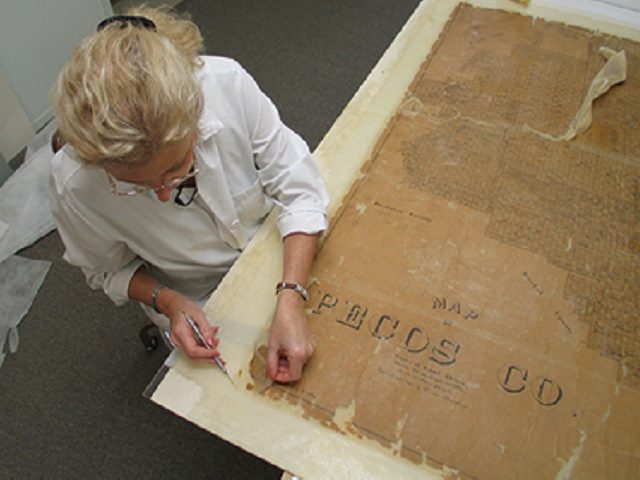The Texas General Land Office (GLO) is asking for help from the public with a program designed to preserve the rich history of the Lone Star State’s documents.
The archives of the GLO contain over 35 million documents dealing with land deeds across the state. Historical maps and other documents are also included in the archives. These documents should be preserved for future generations of Texans and the GLO is asking the public to consider donating money to help move the process forward.
The preservation of these documents is part of a “Save Texas History” program that is run by the GLO.
“It’s a fantastic program that preserves incredible items such as a first draft of the Texas Constitution,” GLO Communications Director Bryan Preston told Breitbart Texas on Friday. Preston said this document contains “the first known written instance of the phrase ‘Republic of Texas.’” Also in the archives is one of the earliest Alamo defender muster rolls, and Stephen F. Austin’s Registro.
Many of the archives treasures that have already been digitally preserved are available for sale via the GLO map store. “At Christmastime it’s a great source for decorative gifts,” Preston elaborated.
“Every day our history is in danger of being lost forever,” GLO Commissioner George P. Bush said in the promotional video below. “It is torn, falling apart, flaking and turning to dust. Texas history deserves better than that.”
Bush asks people who share his concern over Texas history to join in donating $1 per day to a fund being managed by his office. Those who make this commitment to preserving the state’s historical documents will receive a “Texas History Kit” that includes a limited edition picture. Other levels of donation are also suggested on the page with increasing benefits based upon the level of donation. Donations are open to both individuals and businesses.
Saving these documents is very detail oriented, time-intensive task that is very expensive, the Save Texas History website explains. Each of the 35 million documents must be examined and treated to preserve the document’s physical integrity. Once the documents become damaged or illegible, the history contained in the document is lost forever.
The preservation process includes cataloging all of the document to determine their content and condition. Conservators then treat the documents to prevent further deterioration. In some cases, the condition of the documents can actually be improved by removing dirt and damaging acids. Once restored, the documents are digitized and many are posted online where color copies can be purchased.
The GLO has already preserved tens of thousands of documents but much more is needed to be done.
James Harkins is the director of public services at the GLO. He told KXAN reporters Claire Ricke and Jay Wiles that conservation process is not funded by tax dollars. ““We actually do not receive money from the Legislature for conservation,” Harkins told the Austin reporters. “It’s completely dependent on people drawing their own line in the sand and saving Texas history.”
Harkins described how the edges of maps become so fragile that “map flakes” begin to fall off. “If you can’t read these maps, they’re not any good to us. If the ink eats through, if it’s no longer legible, or if the maps are falling apart, they do nobody any good,” Harkins explained.
With millions of documents still in need of restoration, the process will continue for decades to come.
“Will you do your part to save Texas history,” Commissioner Bush asked.
Bob Price serves as associate editor and senior political news contributor for Breitbart Texas and is a member of the original Breitbart Texas team. Follow him on Twitter @BobPriceBBTX.

COMMENTS
Please let us know if you're having issues with commenting.